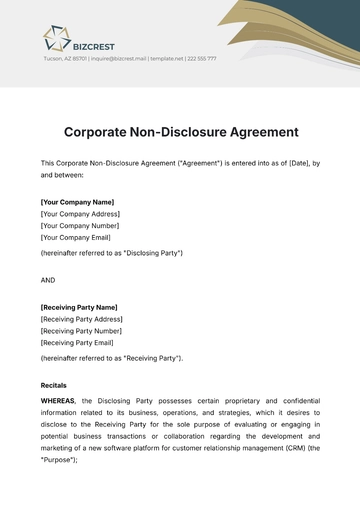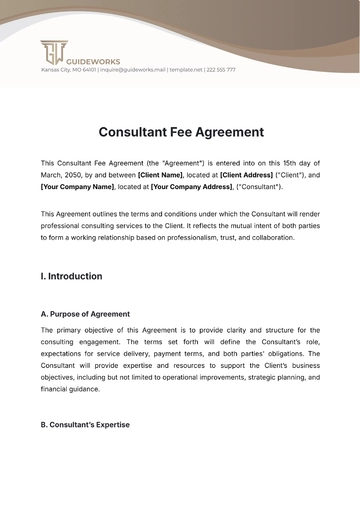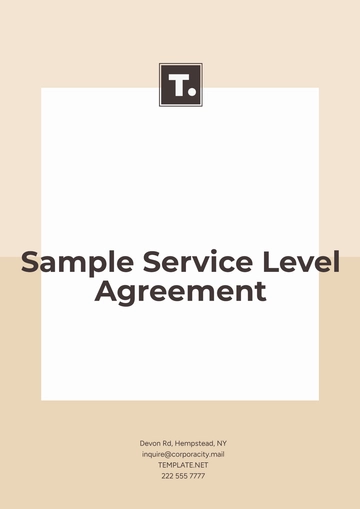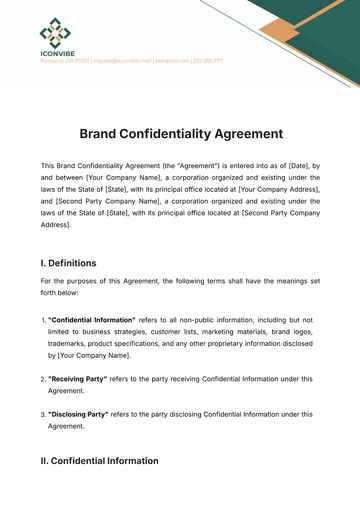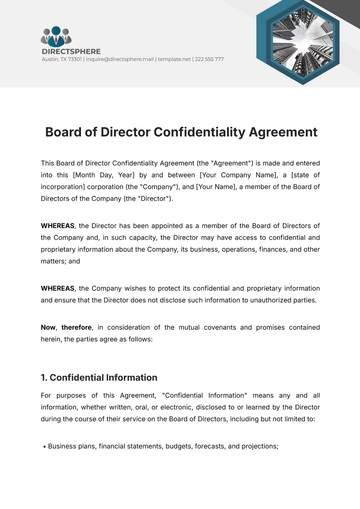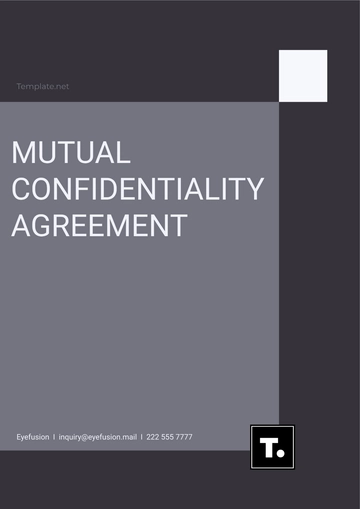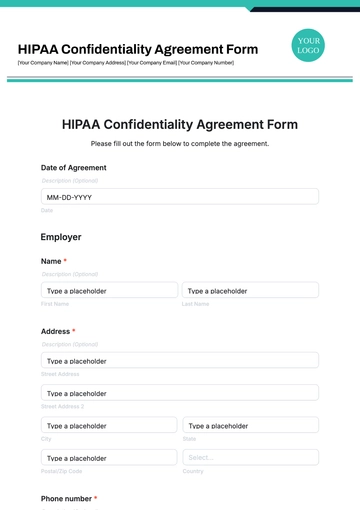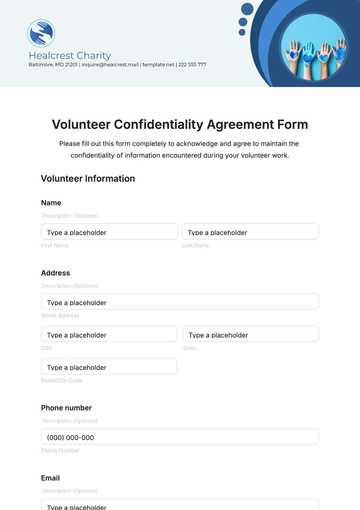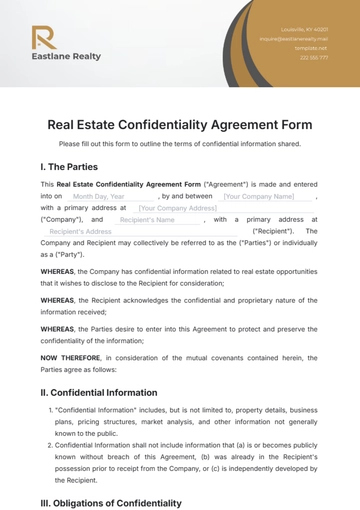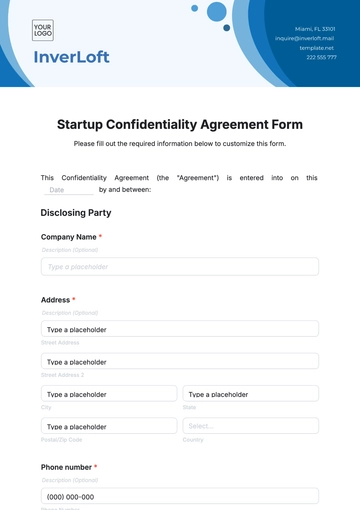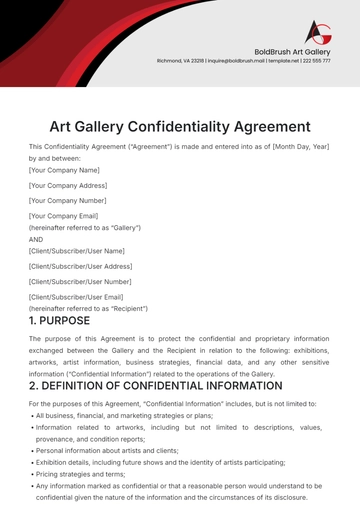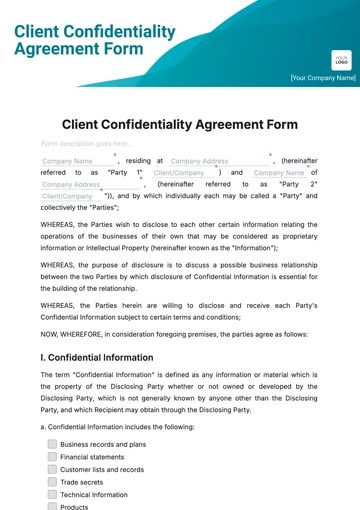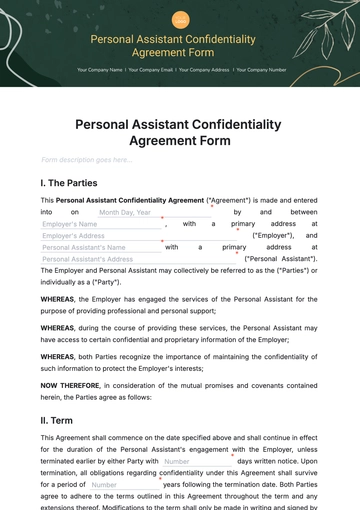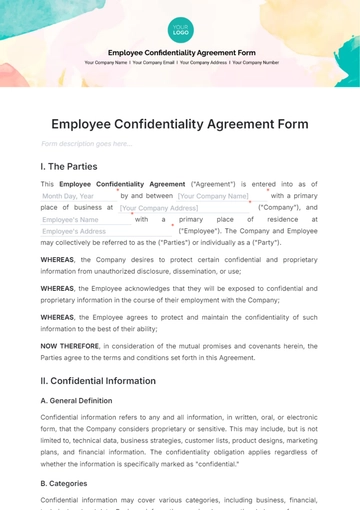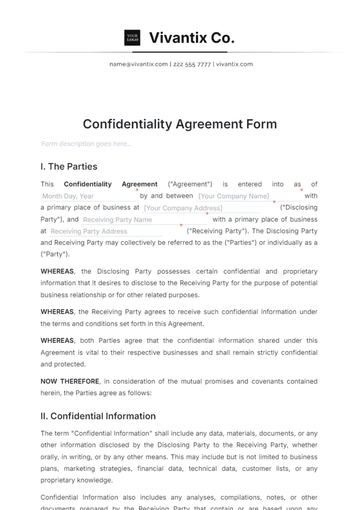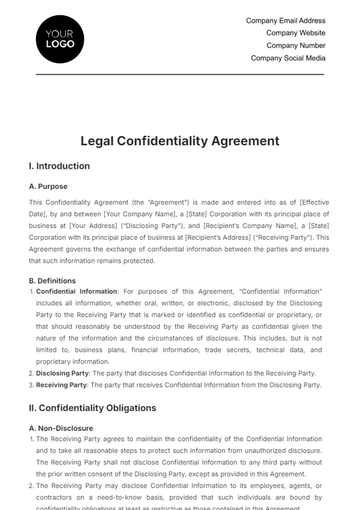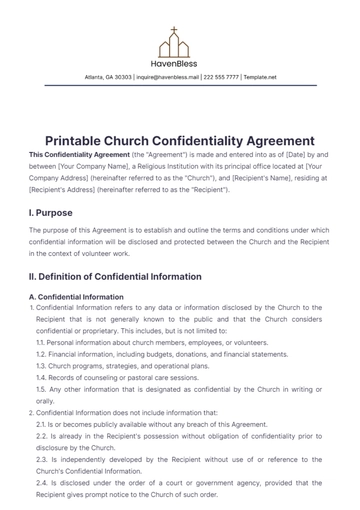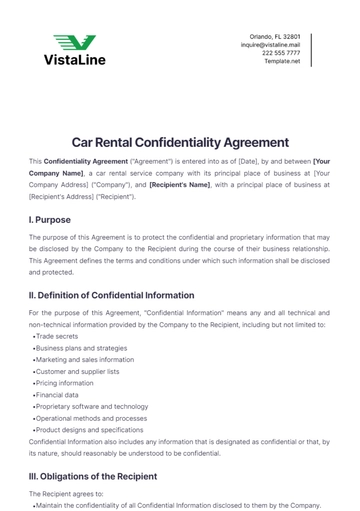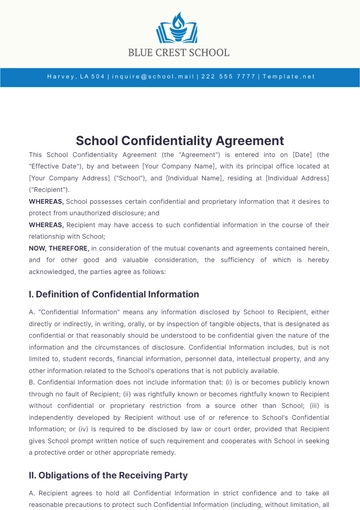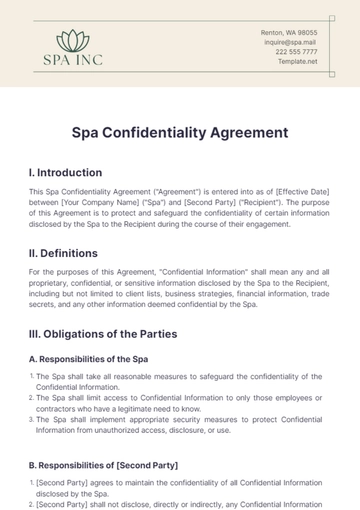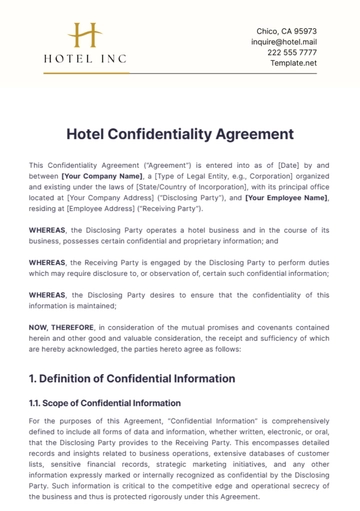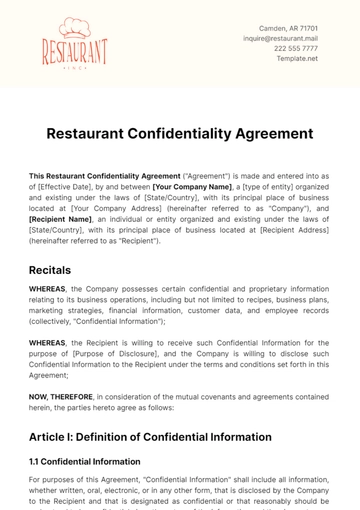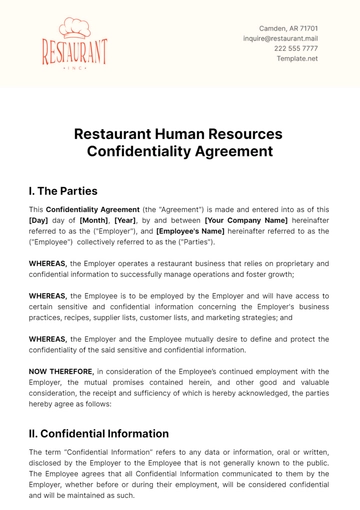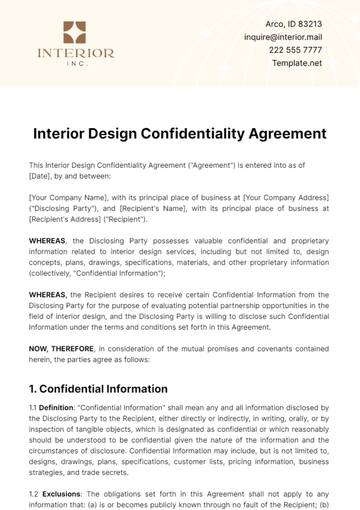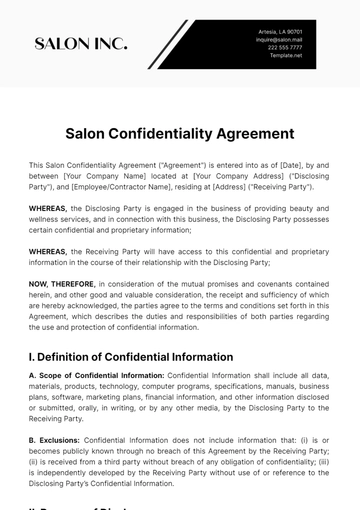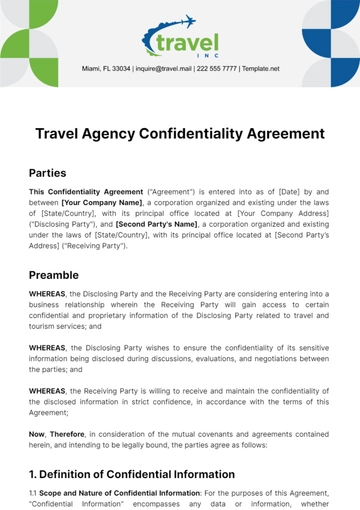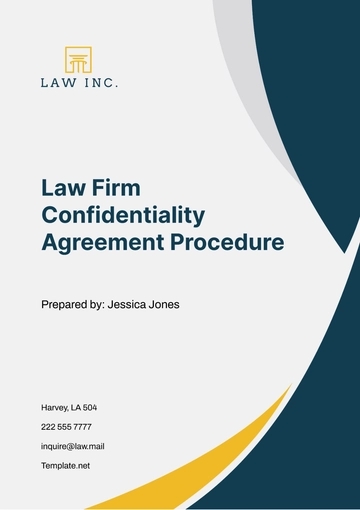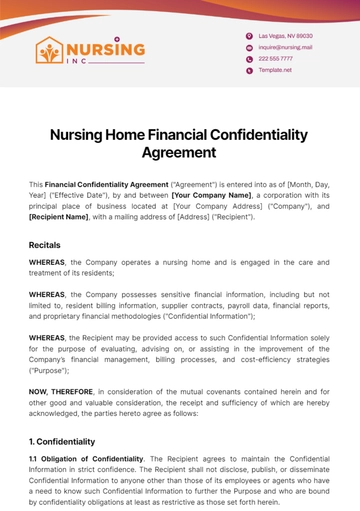Free Operations Confidentiality (NDA) Agreement
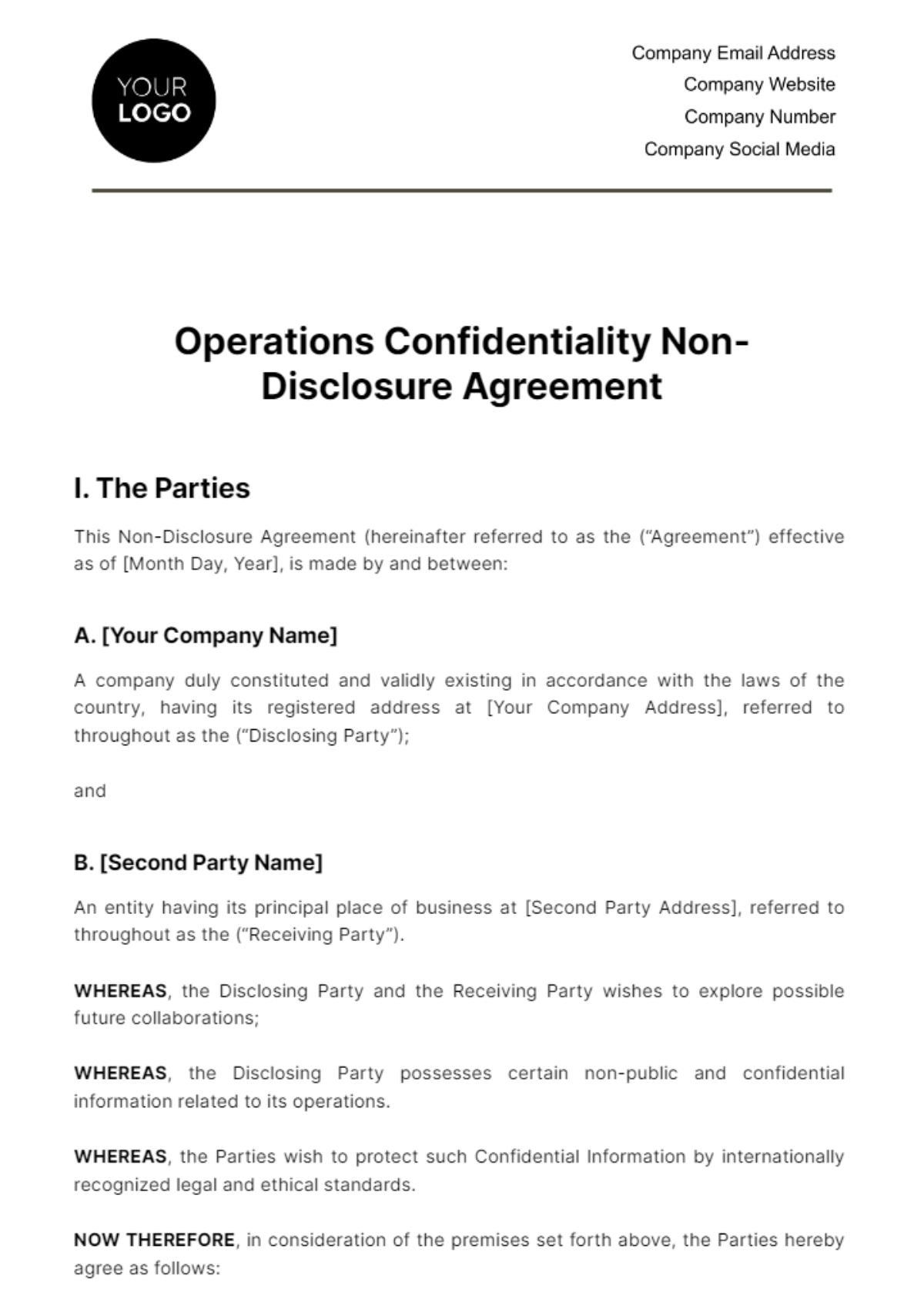
I. The Parties
This Non-Disclosure Agreement (hereinafter referred to as the (“Agreement”) effective as of [Month Day, Year], is made by and between:
A. [Your Company Name]
A company duly constituted and validly existing in accordance with the laws of the country, having its registered address at [Your Company Address], referred to throughout as the (“Disclosing Party”);
and
B. [Second Party Name]
An entity having its principal place of business at [Second Party Address], referred to throughout as the (“Receiving Party”).
WHEREAS, the Disclosing Party and the Receiving Party wishes to explore possible future collaborations;
WHEREAS, the Disclosing Party possesses certain non-public and confidential information related to its operations.
WHEREAS, the Parties wish to protect such Confidential Information by internationally recognized legal and ethical standards.
NOW THEREFORE, in consideration of the premises set forth above, the Parties hereby agree as follows:
II. Confidential Information
A. Definition of Confidential Information
Scope of Confidential Information: Confidential Information, as used in this Agreement, encompasses all data or material possessing commercial value or utility within the business operations of the Disclosing Party. It includes, but is not limited to:
1.1. Operations: Information related to the day-to-day activities and processes crucial for the Disclosing Party's business operations.
1.2. Business Practices: Details about the standard procedures and methodologies adopted in the business conduct of the Disclosing Party.
1.3. Business Plans: Strategic outlines and future courses of action planned by the Disclosing Party for business growth and development.
1.4. Trade Secrets: Proprietary information safeguarded by the Disclosing Party, critical for maintaining a competitive edge in the market.
1.5. Sales Forecasts: Predictions and estimations regarding future sales performance and revenue projections.
1.6. Business Strategies: Strategic approaches and methods employed by the Disclosing Party to achieve business objectives.
1.7. Future Projects and Products: Information about upcoming initiatives and products planned for development and launch.
1.8. Budgets: Financial plans detailing the allocation of resources and expenses for specific business activities.
Specificity of Information: The Receiving Party acknowledges that the Confidential Information may be technical, financial, or strategic in nature and is crucial for the Disclosing Party's business operations.
B. Purpose of Sharing Confidential Information
Exploration of Collaborations: The Parties share Confidential Information with the purpose of exploring potential collaborations.
Protection Goals: Both Parties recognize the need to protect such sensitive information, adhering to internationally recognized legal and ethical standards.
III. Obligations & Restrictions
A. Duration of Confidentiality
Timeframe: Throughout the duration of this Agreement, the Receiving Party is obligated to maintain the confidentiality of the disclosed information.
Limited Purpose: The Receiving Party shall only use the Confidential Information for the purposes explicitly agreed upon and outlined in this Agreement, refraining from any other unauthorized use.
B. Confidentiality Maintenance
Non-Disclosure: The Receiving Party shall not disclose, reproduce, disseminate, or use the Confidential Information for any purpose other than expressly provided for in this Agreement.
Degree of Care: The Receiving Party agrees to protect the Confidential Information with at least the same degree of care that it uses to protect its own confidential and proprietary information. This level of care shall not be less than a reasonable degree under the circumstances.
Authorized Access: Access to the Confidential Information shall be limited to those employees, agents, or representatives of the Receiving Party who require such access for the agreed-upon purposes and who have signed agreements imposing obligations of confidentiality and non-use at least as restrictive as those set forth in this Agreement.
Written Consent: Any disclosure or use of the Confidential Information beyond the scope of this Agreement requires the prior written consent of the Disclosing Party.
C. Handling of Confidential Information
Security Measures: The Receiving Party shall implement strong security standards to safeguard the Confidential Information from unauthorized access, use, or disclosure.
Prompt Notification: In the event of any suspected or actual data breach, compromise, or unauthorized disclosure, the Receiving Party shall promptly notify the Disclosing Party in written form, providing details of the incident.
D. Return or Destruction of Information
Post-Termination Actions: Upon the termination of this Agreement, the Receiving Party shall cease all use of the shared data and promptly delete or return it to the providing Party, as directed by the Disclosing Party.
Irretrievable Destruction: In cases of destruction, the Receiving Party shall ensure that the Confidential Information is irretrievably destroyed, and no copies or remnants are retained.
IV. Exceptions
Notwithstanding the foregoing, Confidential Information shall not include any Information that:
A. Public Knowledge
Information that is or becomes publicly known and widely available through no wrongful act of the Receiving Party shall not be considered Confidential Information. In other words, if the information enters the public domain independently, it is no longer subject to confidentiality.
B. Prior Knowledge
Information already known to the Receiving Party without any restrictions on its use or disclosure at the time of disclosure by the Disclosing Party is exempt from the constraints of this Agreement. This recognizes that if the Receiving Party already possesses the information, there is no need for additional confidentiality restrictions.
C. Independent Development
Information independently developed by the Receiving Party without any violation of the terms of this Agreement shall not fall under the category of Confidential Information. This provision acknowledges that if the Receiving Party creates the same or similar information on its own, it is not bound by the confidentiality obligations.
V. Term and Termination
A. Duration
The Agreement shall continue for a specific duration of [5] years, starting from the Effective Date. This period defines the timeline during which the Agreement remains in force, establishing a clear timeframe for the parties involved.
B. Early Termination
Notice Requirement: The terminating party must provide written notice to the other party, indicating the intention to terminate the Agreement. This ensures that both parties are informed and can prepare for the conclusion of the confidentiality arrangement.
Flexibility: This provision allows for flexibility in case circumstances change, or both parties mutually agree to end the confidentiality obligations earlier. It acknowledges the dynamic nature of business relationships.
C. Survival of Obligations
Post-Termination Obligations: The Receiving Party is still obligated to maintain the confidentiality of the disclosed information even after the Agreement concludes. This ensures that the protection of sensitive information extends beyond the formal duration of the Agreement.
Continued Protection: This emphasizes the ongoing responsibility of the Receiving Party to safeguard the Confidential Information. It reinforces the enduring nature of the commitment to protect the Disclosing Party's proprietary data.
VI. Governing Law
A. Applicable Law
The Agreement is subject to the laws of [State Name]. This ensures that legal matters pertaining to the Agreement are interpreted and enforced based on the laws of a specific jurisdiction. It provides a clear legal framework within which any disputes will be addressed.
B. Exclusive Jurisdiction
The parties agree to the exclusive jurisdiction of the courts in [State Name]. This specifies the legal venue where any disputes related to the Agreement will be adjudicated. A clear designation of jurisdiction streamlines the legal process in the event of a dispute.
C. Legal Recourse
Any disputes arising from the Agreement shall follow legally recognized procedures. Parties commit to resolving disputes through recognized legal channels, ensuring a fair and structured resolution process. This provides a framework for dispute resolution to maintain the integrity of the Agreement.
VII. Signatures
IN WITNESS WHEREOF, the Parties warrant by their signatures below that they have read, understand and agree with the terms and conditions set forth in this non-disclosure agreement.
[Signature]
[Authorized Representative Name]
[Your Company Name]
Disclosing Party
Date: [Month Day, Year]
[Signature]
[Second Party Name]
Receiving Party
Date: [Month Day, Year]
- 100% Customizable, free editor
- Access 1 Million+ Templates, photo’s & graphics
- Download or share as a template
- Click and replace photos, graphics, text, backgrounds
- Resize, crop, AI write & more
- Access advanced editor
Protect sensitive information effortlessly with the Operations Confidentiality (NDA) Agreement Template from Template.net! This essential confidentiality agreement is fully editable, allowing to address specific confidentiality requirements with ease. Utilize our AI Editor Tool to make precise adjustments, ensuring the customizable agreement aligns seamlessly with your confidentiality standards! Try it now!
You may also like
- Lease Agreement
- Non Compete Agreement
- Rental Agreement
- Prenuptial Agreement
- Non Disclosure Agreement
- Operating Agreement
- Hold Harmless Agreement
- LLC Operating Agreement
- Arbitration Agreement
- Purchase Agreement
- Residential Lease Agreement
- Executive Agreement
- Confidentiality Agreement
- Contractor Agreement
- Partnership Agreement
- Postnuptial Agreement
- Collective Bargaining Agreement
- Loan Agreement
- Roommate Agreement
- Commercial Lease Agreement
- Separation Agreement
- Cohabitation Agreement
- Room Rental Agreement
- Child Custody Agreement
- Employee Agreement
- License Agreements
- Settlement Agreement
- Joint Venture Agreement
- Indemnity Agreement
- Subordination Agreement
- Sales Agreement
- Agreements Between Two Parties
- Business Agreement
- Real Estate Agreement
- HR Agreement
- Service Agreement
- Property Agreement
- Agreement Letter
- Restaurant Agreement
- Construction Agreement
- Finance Agreement
- Marketing Agreement
- Payment Agreement
- Investment Agreement
- Management Agreement
- Nonprofit Agreement
- Software Agreement
- Startup Agreement
- Agency Agreement
- Copyright Agreement
- Collaboration Agreement
- Reseller Agreement
- Car Rental Agreement
- Cleaning Services Agreement
- Consultant Agreement
- Deed Agreement
- Car Agreement
- Equipment Agreement
- Shares Agreement
- Data Sharing Agreement
- Advertising Agreement
- School Agreement
- Franchise Agreement
- Event Agreement
- Travel Agency Agreement
- Vehicle Agreement
- Board Resolution Agreement
- Land Agreement
- Binding Agreement
- Tenancy Agreement
- Exclusive Agreement
- Development Agreement
- Assignment Agreement
- Design Agreement
- Equity Agreement
- Mortgage Agreement
- Purchase and Sale Agreement
- Shareholder Agreement
- Vendor Agreement
- Royalty Agreement
- Vehicle Lease Agreement
- Hotel Agreement
- Tenant Agreement
- Artist Agreement
- Commission Agreement
- Consignment Agreement
- Debt Agreement
- Recruitment Agreement
- Training Agreement
- Transfer Agreement
- Apprenticeship Agreement
- IT and Software Agreement
- Referral Agreement
- Resolution Agreement
- Waiver Agreement
- Consent Agreement
- Partner Agreement
- Social Media Agreement
- Customer Agreement
- Credit Agreement
- Supply Agreement
- Agent Agreement
- Brand Agreement
- Law Firm Agreement
- Maintenance Agreement
- Mutual Agreement
- Retail Agreement
- Deposit Agreement
- Land Purchase Agreement
- Nursing Home Agreement
- Supplier Agreement
- Buy Sell Agreement
- Child Support Agreement
- Landlord Agreement
- Payment Plan Agreement
- Release Agreement
- Research Agreement
- Sponsorship Agreement
- Buyout Agreement
- Equipment Rental Agreement
- Farm Agreement
- Manufacturing Agreement
- Strategic Agreement
- Termination of Lease Agreement
- Compliance Agreement
- Family Agreement
- Interior Design Agreement
- Ownership Agreement
- Residential Lease Agreement
- Retainer Agreement
- Trade Agreement
- University Agreement
- Broker Agreement
- Dissolution Agreement
- Funding Agreement
- Hosting Agreement
- Investor Agreement
- Memorandum of Agreement
- Advisory Agreement
- Affiliate Agreement
- Freelancer Agreement
- Grant Agreement
- Master Service Agreement
- Parking Agreement
- Subscription Agreement
- Trust Agreement
- Cancellation Agreement
- Horse Agreement
- Influencer Agreement
- Membership Agreement
- Vacation Rental Agreement
- Wholesale Agreement
- Author Agreement
- Distributor Agreement
- Exchange Agreement
- Food Agreement
- Guarantee Agreement
- Installment Agreement
- Internship Agreement
- Music Agreement
- Severance Agreement
- Software Development Agreement
- Storage Agreement
- Facility Agreement
- Intercompany Agreement
- Lending Agreement
- Lodger Agreement
- Outsourcing Services Agreement
- Usage Agreement
- Assurance Agreement
- Photography Agreement
- Profit Sharing Agreement
- Relationship Agreement
- Rent To Own Agreement
- Repayment Agreement
- Volunteer Agreement
- Co Parenting Agreement
- HVAC Agreement
- Lawn Care Agreement
- SAAS Agreement
- Work from Home Agreement
- Coaching Agreement
- Protection Agreement
- Security Agreement
- Repair Agreement
- Agreements License
